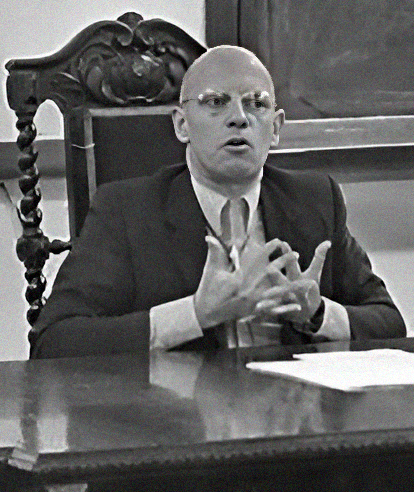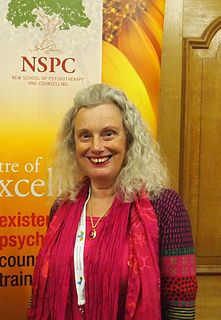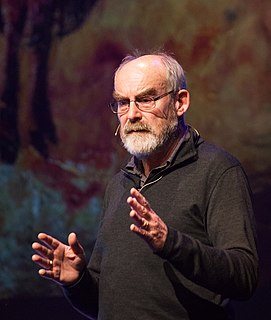
Paul-Michel Foucault was a French philosopher, historian of ideas, writer, political activist, and literary critic. Foucault's theories primarily address the relationship between power and knowledge, and how they are used as a form of social control through societal institutions. Though often cited as a structuralist and postmodernist, Foucault rejected these labels. His thought has influenced academics, especially those working in communication studies, anthropology, psychology, sociology, criminology, cultural studies, literary theory, feminism, Marxism and critical theory.
Deception or falsehood is an act or statement that misleads, hides the truth, or promotes a belief, concept, or idea that is not true. It is often done for personal gain or advantage. Deception can involve dissimulation, propaganda and sleight of hand as well as distraction, camouflage or concealment. There is also self-deception, as in bad faith. It can also be called, with varying subjective implications, beguilement, deceit, bluff, mystification, ruse, or subterfuge.

Happiness, in the context of mental or emotional states, is positive or pleasant emotions ranging from contentment to intense joy. Other forms include life satisfaction, well-being, subjective well-being, flourishing and eudaimonia.

Social constructionism is a theory in sociology, social ontology, and communication theory which proposes that certain ideas about physical reality arise from collaborative consensus, instead of pure observation of said reality. The theory centers on the notion that meanings are developed in coordination with others rather than separately by each individual. It has often been characterised as neo-Marxian or also as a neo-Kantian theory, in that social constructionism replaces the transcendental subject with a concept of society that is at the same time descriptive and normative.
Self-deception is a process of denying or rationalizing away the relevance, significance, or importance of opposing evidence and logical argument. Self-deception involves convincing oneself of a truth so that one does not reveal any self-knowledge of the deception.

Philip George Zimbardo is an American psychologist and a professor emeritus at Stanford University. He became known for his 1971 Stanford prison experiment, which was later severely criticized for both ethical and scientific reasons. He has authored various introductory psychology textbooks for college students, and other notable works, including The Lucifer Effect, The Time Paradox, and The Time Cure. He is also the founder and president of the Heroic Imagination Project.

Harry Frederick Harlow was an American psychologist best known for his maternal-separation, dependency needs, and social isolation experiments on rhesus monkeys, which manifested the importance of caregiving and companionship to social and cognitive development. He conducted most of his research at the University of Wisconsin–Madison, where humanistic psychologist Abraham Maslow worked with him for a short period of time.

The University of California Press, otherwise known as UC Press, is a publishing house associated with the University of California that engages in academic publishing. It was founded in 1893 to publish scholarly and scientific works by faculty of the University of California, established 25 years earlier in 1868, and has been officially headquartered at the university's flagship campus in Berkeley, California, since its inception.
Source criticism is the process of evaluating an information source, i.e.: a document, a person, a speech, a fingerprint, a photo, an observation, or anything used in order to obtain knowledge. In relation to a given purpose, a given information source may be more or less valid, reliable or relevant. Broadly, "source criticism" is the interdisciplinary study of how information sources are evaluated for given tasks.

SAGE Publishing, formerly SAGE Publications, is an American independent publishing company founded in 1965 in New York by Sara Miller McCune and now based in Newbury Park, California.

Horace Romano "Rom" Harré, was a New Zealand-British philosopher and psychologist.
Michael John Scriven is a British-born Australian polymath and academic philosopher, best known for his contributions to the theory and practice of evaluation.

Emmy van Deurzen is an existential therapist. She developed a philosophical therapy based in existential-phenomenology.

Paul Bloom is a Canadian American psychologist. He is the Brooks and Suzanne Ragen Professor Emeritus of psychology and cognitive science at Yale University and Professor of Psychology at the University of Toronto. His research explores how children and adults understand the physical and social world, with special focus on language, morality, religion, fiction, and art.

David John Snowden is a Welsh management consultant and researcher in the field of knowledge management and the application of complexity science. Known for the development of the Cynefin framework, Snowden is the founder and chief scientific officer of Cognitive Edge, a Singapore-based management-consulting firm specializing in complexity and sensemaking.

Edward Elgar Publishing is a global publisher of academic books, journals and online resources in the social sciences and law. The company also publishes a social science and law blog with regular contributions from leading scholars.
Kirk J. Schneider is a psychologist and psychotherapist who has taken a leading role in the advancement of existential-humanistic therapy, and existential-integrative therapy. Schneider is also the current editor of the Journal of Humanistic Psychology. His major books are Existential-Humanistic Therapy (2010), Existential-Integrative Therapy (2008), The Handbook of Humanistic Psychology (2001), The Psychology of Existence (1995), Rediscovery of Awe (2004), Awakening to Awe (2009), and "The Polarized Mind" (2013).
Todd Dufresne is a Canadian social and cultural theorist best known for his work on Sigmund Freud and the history of psychoanalysis. He is Professor of Philosophy at Lakehead University in Thunder Bay, Ontario.
Fred Evans is an American philosopher. He is a Professor of philosophy at Duquesne University and Director of the Center for Interpretative and Qualitative Research. His research and teaching interests are in contemporary continental philosophy, social and political philosophy, and philosophy of language, psychology and technology.
John Thomas Jost is a social psychologist best known for his work on system justification theory and the psychology of political ideology. Jost received his AB degree in Psychology and Human Development from Duke University (1989), where he studied with Irving E. Alexander, David Goldstein, and Lynn Hasher, and his PhD in Social and Political Psychology from Yale University (1995), where he was the last doctoral student of Leonard Doob and William J. McGuire. He was also a student of Mahzarin R. Banaji and a postdoctoral trainee of Arie W. Kruglanski.












